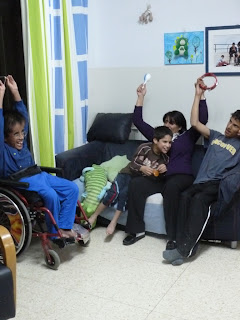We were welcomed by nine boys with special needs from the group Bo'az in Beit Jalla. Most of them are teenagers, the youngest boy is only nine years old and the oldest in his early thirties. Every member of the group has his own special needs and receives support from the wonderful staff of Jemima (www.jemima.nl), the organization that provides them with everything they need.
Karolien, a Belgian volunteer in al-Azzah Refugee Camp, joined me and was a great help during the workshop.
Karolien, a Belgian volunteer in al-Azzah Refugee Camp, joined me and was a great help during the workshop.
We opened with a welcoming song in which every participant was greeted with his name. Although some of the boys did not show any reaction when hearing their name, they all reacted to the sound of the guitar. Some started smiling, others rocked their body with the music.
After the song we played a musical game with a balloon. Issa was a bit afraid from the sounds, but Mohammad loved the balloon and made a nice decoration out of it so we could hang it in the room.
Then we sang an Arabic song about macaroni, here is the translation:
I'm a very poor man,
I don't even have a little house,
and I had to sell my pants,
so I could buy some macaroni to eat!
In Arabic it rhymes....
Issa was not afraid anymore and he asked to repeat the song many times. We will sing it again the following weeks and since the song has eight more verses we won't get bored!
We played another musical game in which the boys had to clap with the music. It was difficult for Anwar to clap, but after half a minute he found a solution: he stamped with his foot on the ground. This was a perfect idea so we started to clap and stamp with the music.
Later, everyone got a music instrument to play with the music. Sameh loved the African shaker and later he accompanied me with the shaker when we sang and played the 'Bye Bye' song on the guitar.
Later, everyone got a music instrument to play with the music. Sameh loved the African shaker and later he accompanied me with the shaker when we sang and played the 'Bye Bye' song on the guitar.
I was very impressed by the involvement of the boys. They all had their own way of expressing themselves and showed creativity.
For the coming period, Musicians without Borders in cooperation with Holy Land Trust will continue to give the Bo'az boys weekly music workshops.
















